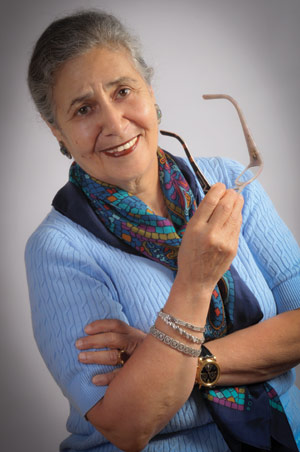
Jacqueline Gmach
Born in Tunisia in 1940, Jacqueline Gmach left at the age of 18. Though her family was not directly in danger, the Nazi genocide remains deeply personal to her. She has devoted her career to educating people about its horrors as well as promoting the Jewish culture its executioners tried to obliterate. A scholar with degrees and credentials from institutions ranging from the Sorbonne in Paris to the University of Jerusalem and the University of Montreal, Gmach serves as project director for USC Shoah Foundation’s Testimonies of North Africa and the Middle East project.
“In a way, it is my story,” Gmach says of the project’s importance to her. In 1968, she married a man who survived the Holocaust as a child. “I constantly sensed the intense difference of culture and Jewish identity,” referring to her husband’s European heritage and her own North African Sephardi background.
She also discovered the importance of learning about each other’s heritage—and especially about their stories. As the North Africa/Middle east collection project director, Gmach is collecting the stories of Jews who survived Nazi persecution in North Africa and the Middle East during World War II—testimonies about the loved ones they lost and what they went through to survive. She explains that the survivors' history, traditions, and experiences are incredibly varied country by country, making the project as challenging as it is rewarding. Gmach also believes the project is important because it documents the different—but equally virulent—ways that anti-Semitism manifested between Arab nations and Europe.
In the years during and after the Holocaust, 800,000 Jews fled the Arab Countries, $300 billion in Jewish assets were left by the Jewish population, and Jewish lands four times the size of Israel were abandoned.
“I sincerely think that the mission of an institution like USC Shoah Foundation can only be complete when it includes the testimonies of Jews from Arab and Muslim countries,” Gmach explains. “Adolf Hitler was determined to exterminate all Jews, wherever they were. And their own dangerous position after the establishment of the state of Israel makes this a particularly important story that must be captured.”
In addition to her work on the new collection (for which she also gave testimony), Gmach has written a memoir: From Bomboloni to Bagel: A Story of Two Worlds. Through short stories, Gmach, with co-author Hillary Selese Liber, recounts her childhood growing up in Tunisia to her experiences living in France, Israel, Canada and finally San Diego, reconciling differences between these cultures and finding her life's purpose.
"The book shows how with determination, even if you belong to another world, you can do [anything]," Gmach said.
Gmach has only been directly involved with Shoah Foundation since 2012, but her expertise in the Arab Jewish experience and her work in both the secular and religious realms have been building toward such an undertaking for many years. A recipient of the 2008 Marla Bennett Humanitarian Award, Ms. Gmach currently serves on the board of the Technion Institute, The Friend of the Israeli Defense Forces, The Encinitas County Library. A current resident of San Diego who, just last year, was honored by that city’s PBS affiliate and Union Bank as a Local Hero for Jewish Heritage Month, Gmach served as program director for the Lawrence Family Jewish Community Center in La Jolla for more than 18 years. In that capacity, she implemented numerous educational events about Jewish identity in general and on the Holocaust in particular, including two multimedia-traveling exhibits, DAVKA, The Survival of a People and GENERATIONS, Survival and The Legacy of Hope. She also has curated such events as the San Diego Jewish Book Fair and the San Diego Jewish Music Festival.
The USC Shoah Foundation’s North Africa/Middle East project’s historical importance is undeniable, but Gmach also sees it as timely. “Too many genocides are happening,” she says. “By understanding the cultural differences, by accepting diversity, by respecting the human being, we eventually will prevent genocides, and ‘never again’ will become a reality.”